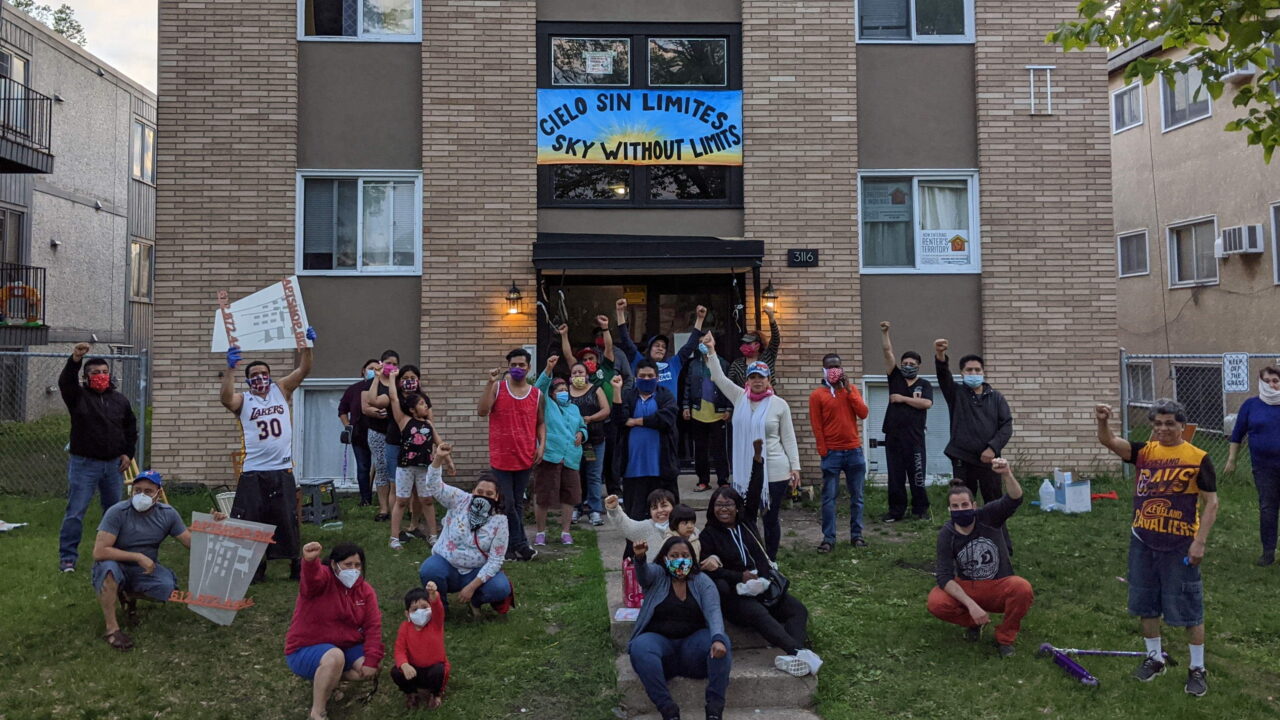Movie buffs often play Six Degrees of Kevin Bacon. It’s a game where you choose a random actor and, by linking them to others they’ve acted with, try to connect them back to Mr. Bacon. In Minneapolis, you could play Six Degrees with the Apartment Shop, the biggest landlord and management company in the city. Until recently, someone always knew someone who lived in an Apartment Shop residence. This single landlord owned 69 buildings with 1,500 units housing over 5,000 people. Most families in the Apartment Shop portfolio were Black, Indigenous, people of color, single mothers, immigrants, or refugees.
The city’s regulatory department employed only two inspectors for more than 90,000 multi-family rental units. The total lack of regulation meant landlords could do as they pleased, without any accountability. The conditions in Apartment Shop buildings were inhumane: cockroach infestations, bed bugs, units without heat during the Minnesota winter, floods, sewage backups, deep mold, electrical issues, and illegal evictions that left families homeless. Meanwhile, Apartment Shop maintained 70 percent profit margins on their buildings.
This is the story of a four-year campaign coordinated by Inquilinxs Unidxs Por Justicia (Renters United for Justice) to organize across the Apartment Shop’s 69-unit portfolio. A campaign that began in tenants’ kitchens and living rooms ended up winning more than $13,000,000 in collective wealth for tenants, stopped more than 1,000 evictions, and put affordable housing on the map in Minneapolis. The campaign culminated in the landlord selling us five buildings to create the “Sky Without Limits” housing cooperative.
If our organizing campaign against Apartment Shop teaches us anything, it’s this: democracy is not a set of practices and principles that one must execute via Robert’s Rules of Order but rather something communities construct together over time. The heart of our campaign was the asambleas — collective circles that brought tenants together and created the conditions for the struggle. Tenants have collective dreams for decommodified housing. Many care deeply about their neighborhoods. Working together, they can offer viable solutions to the housing crisis and a blueprint for collective governance.
The Asambleas
Rewind to a Friday night in 2015, the beginning of the campaign. Pan dulce sits on the table while coffee heats on the stove. We find ourselves in a small room in a small non-profit called Lyndale Neighborhood Organization. Five tenants and their children show up. The children are running around, playing on office computers as if it’s their home. This is our first asamblea. At this point, we are not an official organization; we are just listening to tenants to learn about the problems in their units and organizing off the clock. I’m teaching social studies at an all-Latinx high school; Jennifer Arnold, our co-director, is organizing at Lyndale; and Natasha Villanueva, a founder and volunteer, is working at a community school. We decided to host asambleas on Fridays because that’s when tenants were usually available. To convince people to attend the meetings, we knocked on doors, made oodles of phone calls, and met individually with tenants about their living conditions.
Since then, we’ve held more than 400 asambleas. They are the heartbeat of our organization. Asambleas are made up of four core components: connection, political education, collective strategizing around material needs, and constant reflection on our fight. At asambleas, tenants get to know their neighbors and strategize about how they’ll struggle together for their homes. We do not organize random renters; rather, we organize tenants who live under the same landlord (typically a larger one, owning around 30 buildings) to build power to stop rent increases and win better living conditions. As tenants discuss the risks involved in fighting their landlords, the meetings shape tenant leadership. Asambleas also help rebuild the spirit of community among tenants while moving them down a path of action. Together we learned the first lesson in organizing: we need only each other to develop solutions to our problems.
Connection. At the asambleas, tenants generate friendships, develop traditions, share food, and get to know one another on deeper levels. At one asamblea, we facilitated an “identity tree”; tenants drew an image of a tree and connected it to their childhood and their values. Tenants still talk about this activity two years later. Asambleas happen in a circle so that tenants can look each other in the eye, allowing them to share from a space of balance and create a collective path forward. Asambleas also provide a space for tenants to work through their fears, making them stronger in the struggle. Asambleas are our foundation of hope in the face of constant eviction threats and deplorable living conditions.
Political education. As organizers, we are always looking for ways, in the words of Paulo Frierie, to read the world. At the asambleas, we walk tenants through facilitated conversations around anti-racism, landlord politics, and their experiences in the buildings to help them make sense of the world together. We connect rent increases to the immigrant struggle, apartment living conditions to the prison system. At one meeting, a tenant cried out, “Our apartments are not getting any bigger. Our conditions are terrible, but the rent keeps rising and I have kids to feed!” Through collective conversation, the tenants linked rising rent checks to having less money to pay for food and basic necessities. We used that narrative to challenge rent increases down the line.
Collective strategizing. When evictions were imminent, we used the asambleas to discuss the different risks we might need to take and strategize together about our course of action. This process generated one of our most powerful events to date: a “pilgrimage” on the landlord’s Catholic church during one of their community luau celebrations…in a very white neighborhood. (Tenants facing eviction had been visiting the church weekly and praying with the landlord; he was actually served a subpoena while praying!) We turned out more than 300 tenants and allies, dressed in all white, to the luau, where we sang songs, shared stories of resisting displacement, and gave paper maché flowers to members of the congregation, whom we asked to stand with the tenants. We ended up taking the procession onto the church property, singing our way into tomorrow. For the tenants, the action created new bonds. For the landlord, it showed that we were serious and organized. One of our major funders, Catholic Charities, stopped funding us as a result of the action. But this action was developed by our people; following their lead was more important than any source of funding.
Caminar preguntando (walk while questioning). Over the course of the Apartment Shop campaign, it was womyn who consistently showed up and took the most risk. Reproductive labor isn’t prioritized in our society, but it must be prioritized within our movements. We developed a child care program through our asambleas — from being in a circle, sharing our needs, and crafting solutions together. Our childcare program, and the asambleas that spawned it, are examples of caminar preguntando, the zapatista way of walking while questioning. The child care program now serves our entire organization across many different landlord portfolios, allowing both parents and their children to show up in the struggle. There is much to learn by reflecting on our fight and allowing our needs to shape it.
Community Control
Fast forward to 2019. Our campaign forced the landlord to sell most of his buildings, so we shifted our organizing to focus on the last five buildings — dubbed the Corcoran 5 — which had the worst conditions of the entire portfolio. These buildings later became the Sky Without Limits Cooperative. We met weekly with tenants across the five buildings and held massive actions: we organized role plays to practice negotiations, protested at the landlord’s mansion (three times), disrupted City Council meetings, publicly paid forgotten water bills in the amount of $14,000, held massive community block parties, organized hundreds of allies for an anti-eviction stand-off, built a relief center for food dispersal, wrote letters to the Archbishop, packed court houses, held a community potluck to get the sheriff to refuse to evict tenants, planted guerilla community gardens, and partook in collective mural paintings that we later hung on the buildings. I don’t think there was an action we didn’t do. By May 2020, the landlord agreed to sell the buildings back to the tenants.
We are now in the process of creating the Sky Without Limits Cooperative. We have already invested more than $1,000,000 toward repairs and remodelling, an amount that will increase in the years to come. Currently, a non-profit developer is holding on to the property while we do repairs and create alignment around our collective vision for the future of the cooperative. Our goal is to build a decommodified housing cooperative — one that can never be bought or sold and that will remain affordable to the local community.
The real organizing starts now. We won the buildings; now we must forge a deep commitment among the residents to build a new type of affordable housing that is born from the people. Asambleas helped us get to where we are today by following the will of the people who had severe problems in their apartment units. Recently, we held a vote to figure out the name of our cooperative. We gathered in the front yard as children from the cooperative ran about; tenants voted on pieces of paper, which they placed inside a small house that we had built collectively for a May Day march years before to signify the tenants’ rights struggle. Everyone had a vote, including the children. Our cooperative faces more challenging decisions in the months and years to come, but we will hash them out together, in asamblea.
During our long campaign, it felt like everyone was against us: a landlord using every trick in the book to win his buildings back, a court system that gives power to landlords over tenants, and city officials who simply didn’t want to believe that a cooperative was possible. But our community overcame these obstacles. That community wasn’t a given; it was intentionally constructed over time. I believe that our program of connecting people in asambleas tapped into an ancestral understanding of community. It allowed them a space to voice their nightmares and dream of their tomorrow. Community is the reason for tomorrow. And if the dream is big enough, people will fight for it together.
This summer, as we stood on the grass in front of our new “unity” mural, César (a staff organizer of the cooperative) asked the newly formed board, “What does the cooperative mean to you?” Jazmine, a longtime tenant who led the fight, responded, “For me, the cooperative…signifies a fight that is important for Latinxs and tenants everywhere who struggle so hard for their housing. We are going to work hard to build a strong cooperative so that we will be united. We have had some of the worst treatment you can imagine under the hands of our landlord, but that treatment, that negativity and suffering, was transformed into positivity because we banded together and won. This is a life lesson for me and it teaches us to never give up and always stick together.”

